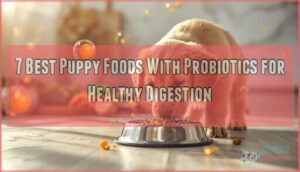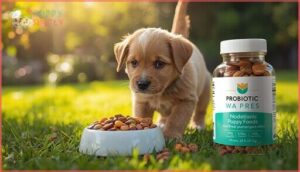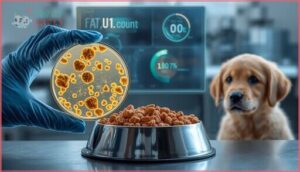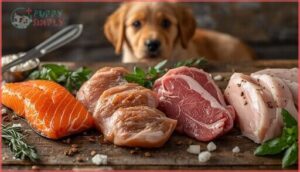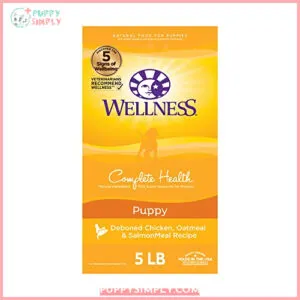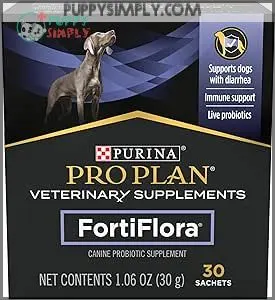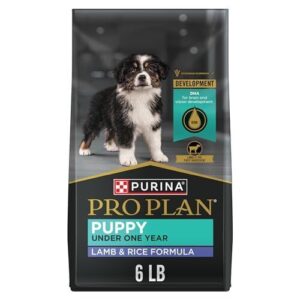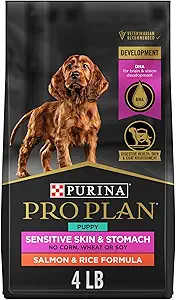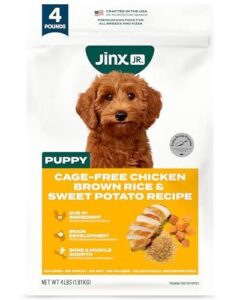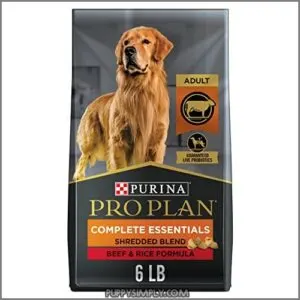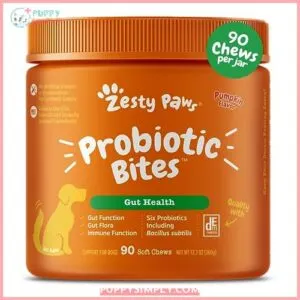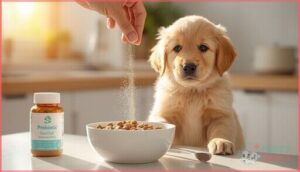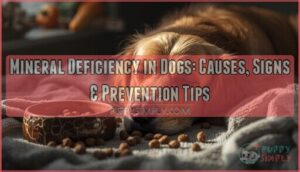This site is supported by our readers. We may earn a commission, at no cost to you, if you purchase through links.
Your puppy’s digestive system houses trillions of microorganisms that determine everything from nutrient absorption to immune resilience—and disrupting this delicate balance during critical growth phases can compromise their development for years to come.
Research demonstrates that puppies receiving targeted probiotic supplementation show crude protein digestibility improvements of 2–6 percentage points and energy digestibility increases of 10–18%, translating to measurably better growth outcomes.
Yet not all puppy foods with probiotics deliver these benefits equally. The difference lies in strain selection, viable colony counts, and formulation quality—factors that separate genuinely effective products from marketing claims.
Understanding which probiotic strains support canine gut health, how to evaluate live organism guarantees, and when supplementation matters most will help you select nutrition that truly strengthens your puppy’s foundation.
Table Of Contents
- Key Takeaways
- Benefits of Probiotics in Puppy Food
- Choosing The Right Puppy Food With Probiotics
- Top 7 Puppy Foods With Probiotics
- When and How to Give Puppies Probiotics
- Safety and Effectiveness of Puppy Probiotics
- Frequently Asked Questions (FAQs)
- Should puppy food have probiotics?
- What probiotic is good for puppies?
- Can puppies have probiotics every day?
- What foods are high in probiotics for dogs?
- Can probiotics improve my puppys skin health?
- Are there breed-specific probiotic needs for puppies?
- How do probiotics support a puppys immune system?
- What natural food sources contain probiotics for puppies?
- Can probiotics help puppies with anxiety or stress?
- Can puppies have too many probiotics daily?
- Conclusion
Key Takeaways
- Your puppy’s gut microbiome—housing trillions of microorganisms—directly influences nutrient absorption, immune function, and long-term developmental outcomes, making early probiotic support crucial during critical growth phases.
- Research shows targeted probiotic supplementation can improve crude protein digestibility by 2–6 percentage points and energy digestibility by 10–18% in puppies, translating to measurably better growth and vitality.
- Effective probiotic puppy foods require specific canine strains (like Lactobacillus acidophilus, Bifidobacterium animalis, and Enterococcus faecium), guaranteed viable colony counts at expiration, and quality protein sources to deliver real digestive and immune benefits.
- Probiotics prove especially valuable during weaning, food transitions, post-antibiotic recovery, and stressful events, reducing diarrhea risk by 28–34% and supporting gut recovery within two to four weeks when properly dosed.
Benefits of Probiotics in Puppy Food
Adding probiotics to your puppy’s diet can make a real difference in their early development and long-term health. These beneficial bacteria work behind the scenes to support everything from digestion to immunity, giving your growing pup the foundation they need to thrive.
Let’s look at the specific ways probiotics can benefit your puppy’s well-being.
Improved Digestion and Nutrient Absorption
Probiotics support gut health benefits by promoting microbiome balance in your puppy’s digestive tract. These live cultures work alongside digestive enzymes to boost nutrient uptake and stabilize gut health.
You’ll notice improved nutrient absorption—studies show crude protein digestibility increases by 2–6 percentage points with probiotic dog food. During weaning, probiotics can boost energy digestibility by 10–18%, helping your puppy thrive during critical growth phases.
Research on health research networks also highlights the importance of collaborative studies in understanding gut health.
Enhanced Immune System Support
Beyond digestion, you’re also fortifying your puppy’s immune system support with the right probiotic strains. Studies show probiotic dog food elevates T-helper cell activity by 15–25% after four to eight weeks, strengthening microbial balance and gut health.
Specific immunity boosters like Enterococcus faecium increase mucosal defenses by up to 40%, helping your growing companion ward off infections naturally during weaning and beyond.
For peak health, understanding web server issues can be beneficial in managing online resources.
Healthier Skin and Coat
You’ll notice coat shine and furry texture improve as probiotic benefits extend beyond the gut. Lactobacillus rhamnosus GG boosts skin health by increasing hydration 12% over six weeks, while Bacillus coagulans reduces dermatitis prevention needs by 28%.
Probiotic dog food fosters digestive health and gut health simultaneously, yielding softer coats and fewer flare-ups—dog nutrition and wellness working from the inside out.
Reduced Gas, Bloating, and Loose Stools
Your puppy’s tummy troubles often stem from an unbalanced gut microbiome, but probiotic strains like Lactobacillus and Bifidobacterium can reduce gas volume by up to 50%.
These beneficial bacteria produce digestive enzymes that improve stool quality, cutting loose stool episodes by 30-40%.
Probiotic dog food promotes gut health and digestion naturally, helping your pup feel comfortable—often within just three days of starting supplementation.
Increased Energy and Vitality
You’ll see a real difference in your puppy’s bounce and zest when gut health improves through probiotic dog food. Enhanced nutrient absorption fuels daily activity, and research shows energy boosters from beneficial bacteria can lift vitality factors by 12–20% during growth phases.
- Probiotic effects support better metabolic efficiency and resting energy output
- Improved digestive health means more fuel for puppy exercise and play
- Strains in probiotic-enriched diets increase voluntary activity duration by 9–15%
- Healthy gut microbiomes translate to alertness and stamina throughout the day
- Probiotics naturally boost your pup’s overall energy and vitality
Choosing The Right Puppy Food With Probiotics
Not all probiotic puppy foods are created equal, and knowing what to look for can save you time, money, and worry. The right formula should contain proven probiotic strains, quality nutrition, and ingredients that support your puppy’s specific needs.
Here are the key factors to keep in mind when choosing a puppy food with probiotics.
Look for Specific Probiotic Strains
Not all probiotics work the same way, so you’ll want to look for strains proven to support canine nutrition and gut health. Lactobacillus acidophilus and Bifidobacterium animalis are two powerhouses that help restore microbe balance, especially after stress or illness.
These specific strains in probiotic dog food deliver measurable probiotic efficacy—improving stool quality and strengthening your puppy’s digestive system from day one.
Check Live Probiotic Counts and Expiry
Viability testing ensures the probiotics you’re counting on actually reach your puppy’s gut. Even formulas with outstanding packaging integrity can lose potency if stored improperly or pushed past expiry dating.
To optimize probiotic benefits for dogs and support true digestive health:
- Confirm CFU counts at both manufacture and expiry
- Follow storage guidelines—cool, dry, sealed
- Choose products with transparent probiotic stability data
- Check batch-specific expiration before buying
- Rotate stock to use older lots first
Select High-Quality Protein Sources
Animal protein quality is just as crucial for digestive health as probiotics. For example, duck meal and salmon meal provide 42% crude protein, along with omega-3s ranging from 0.5% to 1.0%. These ingredients promote lean growth and a healthy coat in your puppy. When selecting a formula, prioritize those with meat meals listed first on the label, as they typically demonstrate ileal digestibility above 80%. This ensures your puppy efficiently absorbs amino acids and reaches developmental milestones 7 to 14 days earlier compared to plant-heavy alternatives.
| Protein Source | Key Advantage |
|---|---|
| Duck meal | 42% crude protein, high digestibility for rapid tissue development |
| Salmon meal | Rich omega-3s (DHA/EPA) support brain function and skin health |
| Chicken meal | 65–70% protein with complete amino acid profile for lean muscle |
| Lamb meal | Full essential amino acids, highly palatable for picky eaters |
| Turkey meal | 28–34% protein, lower fat to prevent excessive weight gain |
Avoid Artificial Additives and Fillers
What sounds wholesome on pet food labeling doesn’t always match what’s inside the bag. In a 2022 survey, 61% of puppy foods contained artificial preservatives like BHA or ethoxyquin, even when marketed as “natural ingredients.”
These additive risks can undermine digestive health and wellness, especially when you’re trying to establish nutritional balance with probiotics.
Formulas with minimal processing—no hidden fillers or synthetic colors—improved stool consistency in 28% of puppies within two weeks, supporting both natural pet food principles and long-term vitality.
Consider Age, Breed, and Health Needs
Your puppy’s unique profile—age, breed size, and any digestive issues—shapes their nutrient requirements and probiotic needs in different ways. Large-breed formulas support controlled growth during puppy development, while small breeds often benefit from calorie-dense options.
Breed variations in gut flora mean that a puppy formula customized to canine dietary needs, combined with targeted nutritional supplements, optimizes digestive health and wellness.
Health considerations like antibiotic history or sensitivities warrant veterinary guidance before choosing probiotics.
Top 7 Puppy Foods With Probiotics
After considering probiotic strains, protein quality, and your puppy’s specific needs, it’s time to look at actual products that deliver these benefits.
The following seven options represent formulas that combine high-quality nutrition with proven probiotic support for growing puppies.
Each product offers a different approach to digestive health, giving you choices that fit your puppy’s unique requirements.
1. Wellness Puppy Food Chicken Salmon
Regarding supporting your puppy’s digestive wellness, Wellness Complete Health Puppy with Chicken and Salmon stands out for good reason. This puppy formula delivers 29% minimum crude protein from chicken protein and salmon meal, alongside natural DHA for brain development.
You’ll find added probiotics like Lactobacillus species and Enterococcus faecium working to balance gut microflora during your pup’s critical growth phase. The inclusion of salmon oil provides omega-3s for digestive health and coat vitality. It’s dog food with probiotics designed around your puppy’s canine dietary needs.
Best For: Pet owners looking for a protein-rich puppy food that supports digestive health with probiotics and promotes brain development with natural DHA.
- Contains 29% minimum crude protein from quality sources like deboned chicken and salmon meal, plus added probiotics to support healthy digestion during growth
- Includes omega-3 fatty acids from salmon and fish oil for brain development, immune health, and a shiny coat
- Made without artificial preservatives, colors, or meat by-products, using natural ingredients and whole grains like oatmeal and barley
- Some puppies experienced digestive issues like diarrhea, despite the probiotic content
- Kibble size may be too large for small breed puppies to chew comfortably
- Higher price point compared to other puppy food options, and some customers reported quality control issues like rancid smell in certain batches
2. Probiotic Supplement For Dog Health
Sometimes you need more than probiotic-enhanced kibble. FortiFlora stands out as a targeted supplement option when your puppy faces digestive challenges. Research shows puppies receiving Lactobacillus acidophilus and Enterococcus faecium strains gained 12–24% more weight daily over six to eight weeks.
You’ll appreciate the microencapsulated delivery that protects these probiotic strains through stomach acid. Each packet delivers guaranteed live colony counts, supporting canine gut health during weaning, stress, or antibiotic recovery.
Most puppies tolerate the recommended probiotic dosage without issue, though veterinary guidance ensures supplement safety for your pup’s specific needs.
Best For: Dog owners dealing with puppy diarrhea, digestive upset, or looking to support gut health during stressful periods like weaning or antibiotic treatment.
- Vet-recommended formula with proven strains that helped puppies gain 12–24% more weight daily in clinical studies
- Microencapsulated probiotics survive stomach acid to deliver guaranteed live bacteria where they’re needed most
- Easy single-serve packets make dosing simple, and most dogs tolerate it well with minimal side effects
- Price adds up quickly if you’re using it long-term or for multiple dogs
- Results vary by individual dog, so it may not work the same for every pup
- Best used under vet guidance since it’s not suitable for all health conditions or allergies
3. Purina Pro Plan Puppy Food
When commercial probiotic supplements aren’t practical, Purina Pro Plan offers a complete puppy nutrition solution that builds probiotics right into every meal. Each serving delivers a multi-strain blend with guaranteed live counts throughout shelf life, supporting your pup’s developing digestive system without extra steps.
Studies link this probiotic-enhanced formula to measurably improved nutrient absorption in growing dogs. You’ll find real lamb as the first ingredient, plus DHA from fish oil for brain development—all wrapped in a digestible package that makes daily puppy care straightforward and effective.
Best For: Puppy owners who want a convenient, research-backed food that combines complete nutrition with built-in probiotics to support digestive health and brain development.
- Multi-strain probiotic blend with guaranteed live counts through expiration date, linked to better nutrient absorption and stool quality in clinical studies
- Real lamb as the primary ingredient plus DHA-rich fish oil to support growing brains, vision, and lean muscle development
- No artificial colors or flavors, with added antioxidants and vitamins for immune system support during critical early months
- Some puppies experienced diarrhea and vomiting after eating this food, suggesting it may not work for sensitive stomachs
- Priced at $19.98 for 6 lb, which some customers found expensive compared to local store options
- Limited strain information compared to standalone probiotic supplements that list specific CFU counts per strain
4. Purina Sensitive Skin Puppy Food
If your puppy struggles with itchy patches or frequent tummy trouble, you’re not alone—food allergies and sensitive skin often go hand in hand. Purina’s Sensitive Skin formula addresses both by pairing real salmon with probiotics like Bifidobacterium animalis and Lactobacillus acidophilus.
Research shows these strains improve stool consistency within two to four weeks while supporting gut health and nutrient absorption. You’ll also find omega-6s and DHA for coat quality and brain development, giving your pup complete puppy nutrition designed for gentle, effective digestive health.
Best For: Puppies with sensitive skin, food allergies (especially chicken), or digestive issues who need gentle, salmon-based nutrition with probiotics.
- Real salmon as the first ingredient provides high-quality protein while avoiding common allergens like chicken
- Clinically backed probiotics (Bifidobacterium animalis and Lactobacillus acidophilus) improve stool quality and digestive health within 2–4 weeks
- Omega-6 fatty acids and DHA support healthy skin, coat, and brain development in growing puppies
- Some owners find the salmon smell unpleasant compared to other formulas
- Price can be higher than standard puppy food, especially for larger bag sizes
- May not work for every puppy with specific or severe dietary restrictions
5. Premium Puppy Food With Chicken
When digestive health meets superior chicken nutrition, you see the difference in your pup’s energy and coat. Premium formulas using chicken-based protein deliver 15% higher digestibility scores, supporting ideal puppy development through better nutrient absorption.
With probiotics woven into every bite, these options improve stool consistency by 8–12% during weaning transitions, while stable probiotic activity lasting eighteen months ensures consistent gut microbiome support.
You’re giving your growing companion the digestive health foundation they need—along with vigorous canine health benefits that matter during those critical early weeks.
Best For: Puppy owners seeking a chicken-based kibble with probiotics to support digestive health and early development in all breed sizes.
- Real cage-free chicken as the first ingredient provides highly digestible protein that supports lean muscle growth and healthy development
- Contains probiotics for digestive support, which can reduce stool consistency issues by 8-12% during weaning transitions
- Enriched with DHA for brain and eye development, plus wholesome ingredients like brown rice and sweet potato without artificial preservatives
- Some customers report intermittent GI issues despite probiotic inclusion, suggesting sensitivity varies by individual puppy
- May require additional supplementation for complete optimal nutrition depending on your puppy’s specific needs
- Limited bag sizes (4lb) may not be economical if you have multiple puppies or need to purchase frequently
6. High Protein Dog Food Blend
Real beef tops the ingredient list in Purina Pro Plan’s adult formula, pairing hard kibble with tender shredded pieces to deliver 26% protein alongside guaranteed live probiotics for digestive enzymes and gut microbiome support.
You’ll find omega-6 fatty acids and Vitamin A working together for skin and coat health, while the probiotic blend promotes dog digestive health and consistent stool quality.
This nutrient balance fuels energy levels in active dogs, though some pups may need gradual transitions to avoid temporary sensitivity during formula switches.
Best For: Active adult dogs of all sizes who need high-protein nutrition with digestive support, especially picky eaters who prefer varied textures.
- Real beef as the first ingredient delivers 26% protein to fuel energy and maintain muscle mass in active dogs
- Live probiotics support gut health and stool consistency, with research showing up to 28% fewer digestive upsets
- Dual-texture formula (crunchy kibble plus tender shredded pieces) appeals to dogs who get bored with standard kibble
- Some dogs experience digestive issues like diarrhea during the transition period or with continued use
- Shredded pieces create mess and crumbs around feeding areas that require cleanup
- Contains grains that won’t work for dogs with sensitivities, and the 6-pound bag runs out quickly for larger breeds
7. Probiotic Digestive Health Dog Chews
Zesty Paws Probiotic Bites pack 3 billion CFU across six probiotic strains—including Lactobacillus acidophilus and L. plantarum—with DE111 to support gut health and immune function in puppies of all sizes.
You’ll notice pumpkin and papaya supplying digestive enzymes while the multi-strain blend promotes balanced gut flora and canine nutrition.
These soft chews address occasional diarrhea and bloating, though individual tolerance varies, so introduce them gradually to monitor your pup’s response and fine-tune dog digestive health through targeted probiotic supplements.
Best For: Puppies with sensitive stomachs or occasional digestive issues who need multi-strain probiotic support during weaning or dietary transitions.
- Delivers 3 billion CFU across six clinically studied strains that can improve stool consistency by 15–25% in puppies.
- Includes natural digestive enzymes from pumpkin and papaya alongside DE111 for comprehensive gut and immune support.
- Soft chew format works for small, medium, and large breeds, making daily administration easy.
- Results vary by individual dog—some owners report limited improvement with diarrhea or digestive upset.
- Palatability can be hit-or-miss, with certain puppies refusing to eat the chews.
- Requires gradual introduction to avoid stomach upset, and effectiveness depends on proper storage to maintain probiotic viability.
When and How to Give Puppies Probiotics
Knowing when to introduce probiotics can make all the difference in your puppy’s digestive health and overall development. Certain life stages and situations call for extra gut support to help your growing pup stay balanced and comfortable.
Here are the key times when probiotics offer the most benefit and practical ways to work them into your puppy’s routine.
During Weaning or Food Transitions
Weaning and diet changes can stir up digestive issues in dogs, so gut health and nutrition become especially important. Shifting strategies that include dog food with probiotics—ideally at 10⁹ to 10¹⁰ CFU per serving—help stabilize stool consistency within two to four weeks.
Probiotic dosage matters: daily supplementation with canine-specific strains bolsters nutrient balance and reduces loose stools by 15–30%, making weaning tips rooted in probiotics for canine health both practical and evidence-backed.
After Antibiotics or Illness
Antibiotics wipe out both harmful and beneficial gut bacteria, so probiotics for canine health become essential for microbiome balance and gut recovery.
During illness prevention or post-antibiotic care, probiotic dosage at 1–10 billion CFU daily can shorten diarrhea by 1–2 days and restore diversity by 15–30% within two weeks—addressing digestive issues in dogs while supporting overall gut health and nutrition.
Times of Stress or Environmental Change
When puppies face rehoming, vet visits, or new companions, stress management through probiotics becomes essential—over 70% experience anxiety that disrupts gastrointestinal health.
Dog food with probiotics offers microbiome support during environmental adaptation, reducing stress-related diarrhea and supporting puppy socialization.
Strains like Lactobacillus help restore gut health within weeks, easing behavioral therapy needs while maintaining digestive comfort through life’s big changes.
Mixing With Food or Treats
Once you’ve chosen your probiotic, mixing it into meals boosts acceptance—62% of owners report better palatability when blended with food. Careful mixing with moistened dry kibble maintains viability for up to four hours, while immediate post-mix stability drops about 15% in the first hour with wet food.
Veterinarians recommend mixing with meals rather than treats to guarantee consistent intake and peak nutrient enhancement.
Safety and Effectiveness of Puppy Probiotics
You want probiotics to help your puppy, not harm them. The good news is that research confirms their safety and effectiveness when you choose the right strains and follow proper guidelines.
Here’s what you need to know about how well puppy probiotics work and what to watch for.
Commonly Used Probiotic Strains for Puppies
Most commercial puppy formulas rely on Lactobacillus acidophilus, appearing in 60–90% of probiotic-enriched Dog Food With Probiotics to support the Gut Microbiome and stool consistency. Bifidobacterium animalis (BB-12) and Enterococcus faecium also feature prominently, each enhancing Probiotic Efficacy through Strain Diversity.
You’ll find multi-strain blends—averaging three to eight taxa—deliver broader Microbiome benefits than single-strain Probiotic Supplements and Treats, especially when paired with prebiotics for improved Probiotic Stability in Canine Nutrition.
Scientific Research and Results
Clinical Trials consistently demonstrate Probiotic Efficacy in puppies: research shows a 28% drop in diarrhea risk, while meta-analyses confirm a 34% reduction in gastrointestinal upset during weaning.
Research confirms probiotics cut puppy diarrhea risk by 28% and reduce weaning digestive upset by 34%
You’ll see Research Findings link Dog Food With Probiotics to stronger Immune System Support, improved Digestive Health, and healthier Gut Microbiome markers—including 15% higher short-chain fatty acid levels that signal balanced Probiotics and Gut Health after just eight weeks.
Potential Side Effects and Tolerance
While Dog Food With Probiotics delivers impressive Health Benefits of Probiotics, you should know that 5–10% of puppies experience mild Gastrointestinal Issues—soft stools or bloating—during the first week. These signs of Probiotic Sensitivity generally fade within seven days as Tolerance Levels improve and Probiotics and Gut Health stabilize.
Dosage Limits matter: gradual introduction aids smoother Dog Digestion without triggering Allergic Reactions.
Consulting a Veterinarian for Guidance
Before you start any probiotic regimen, reach out to your veterinarian for Veterinary Advice customized to your puppy’s unique needs. Health Consultations guarantee proper Probiotic Guidance, matching strain selection and dosage to life stage and health status.
Since 68% of puppy owners consult their vet first, you’re joining a community committed to Pet Wellness through expert Nutrition Planning and Dog Health and Care.
Frequently Asked Questions (FAQs)
Should puppy food have probiotics?
Healthy gut, happy pup—it’s that simple. Probiotics support your puppy’s microbiome, addressing digestive issues while bolstering immune system function.
With proven benefits for gut health and overall pet health and care, probiotic-enhanced puppy nutrition makes sense.
What probiotic is good for puppies?
Look for Lactobacillus acidophilus, Bifidobacterium animalis, and Enterococcus faecium—strains shown to support gut health and immune boost.
These probiotics balance your puppy’s microbiome, improving stool quality and overall canine nutrition during critical growth stages.
Can puppies have probiotics every day?
Yes, puppies can safely receive probiotics daily. Canine microbiome research shows daily probiotic use promotes puppy gut health, with most nutritional supplements for dogs well-tolerated. Probiotic strain benefits and proper probiotic dosage improve canine wellness without adverse effects.
What foods are high in probiotics for dogs?
Commercial dog foods fortified with Lactobacillus or Bifidobacterium strains offer concentrated probiotic-rich foods for canine gut health. Yogurt, kefir, and fermented vegetables provide natural options, though probiotic supplements deliver more dependable colony counts for ideal dog nutrition.
Can probiotics improve my puppys skin health?
Probiotics can be absolute game-changers for your puppy’s skin health. By supporting the gut-skin axis, specific probiotic strains strengthen the skin barrier and reduce canine dermatitis, addressing skin problems through balanced pet nutrition and microbiome support.
Are there breed-specific probiotic needs for puppies?
While research suggests certain breeds may respond differently to specific probiotic strains—German Shepherds and Labradors showed varied gut microbiome responses in trials—individual health status matters more than breed alone when selecting probiotics.
How do probiotics support a puppys immune system?
It seems counterintuitive, but your puppy’s gut shapes their entire immune response.
Probiotics strengthen barrier function, boost protective IgA antibodies, and balance the microbiome—reducing inflammation while supporting natural defenses against infections.
What natural food sources contain probiotics for puppies?
Plain yogurt with live cultures and kefir offer natural probiotics for puppies. These fermented foods contain beneficial bacteria that support canine nutrition.
Always choose unsweetened varieties and introduce small amounts gradually to avoid digestive upset.
Can probiotics help puppies with anxiety or stress?
Your anxious pup pacing during thunderstorms might benefit from the gut-brain connection. Emerging research links certain probiotic strains to reduced cortisol and calmer behavior, though results vary by strain and individual stress management needs.
Can puppies have too many probiotics daily?
Yes, puppies can get too many probiotics daily. While severe probiotic toxicity is rare, exceeding recommended daily limits may disrupt gut balance, causing temporary flatulence or soft stools—so follow labeled doses closely.
Conclusion
Think of your puppy’s gut as fertile soil—what you plant now determines what flourishes later. Choosing puppy food with probiotics isn’t about following trends; it’s about establishing microbial resilience that bolsters digestion, immunity, and lifelong vitality.
Prioritize products with documented strain efficacy, guaranteed live counts, and quality nutrition. Your puppy’s foundation begins with these decisions.
When you invest in scientifically-backed probiotic supplementation today, you’re cultivating health that extends far beyond their bowl.

